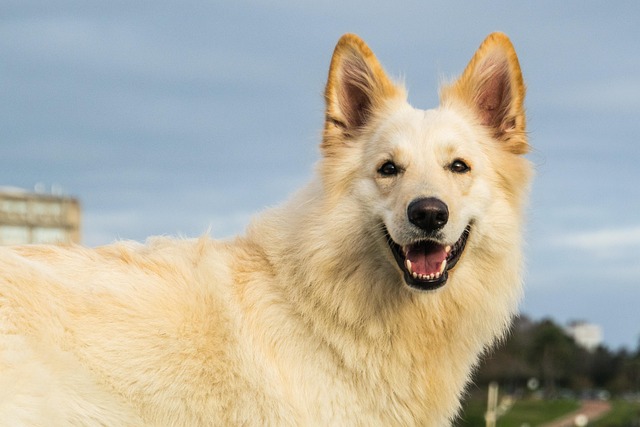
What is glaucoma in a dog?
You might notice your dog squinting more at mealtime or avoiding bright sunlight—these small changes could be early signs of a serious eye condition.
When we welcome dogs into our homes with joy, they are like angels descending, bringing endless joy and warmth to life. From that moment on, we have shouldered the responsibility of taking care of them for a lifetime, and ensuring that dogs receive the ideal nutrition is a crucial part of this responsibility. The ideal nutrition for dogs is like a magical key, opening the door to their healthy and energetic life, carrying our deep love and expectations for them.
Protein is undoubtedly the cornerstone of ideal nutrition for dogs. It plays an irreplaceable role in the growth, repair, and maintenance of dogs' bodies. During the puppy stage of a dog, the body develops rapidly, and protein is like the bricks of a high-rise building, providing essential amino acids for the construction of tissues such as bones, muscles, and hair. High quality animal protein, such as chicken, beef, fish, eggs, etc., is rich in various essential amino acids that dogs cannot synthesize on their own, which can meet the vigorous growth needs of puppies. As dogs grow older, protein remains essential. In daily activities, muscles may suffer minor injuries due to exercise, and protein can help repair these injuries and maintain muscle strength and vitality. For elderly dogs, appropriate protein intake can help maintain muscle mass, delay muscle loss, and enable them to maintain a certain level of mobility in old age.
Carbohydrates also play an important role in the nutritional system of dogs. It is one of the main sources of energy for dogs. Moderate carbohydrates, such as starch from grains (rice, oats, etc.) and potatoes (sweet potatoes, potatoes), can provide sustained energy for dogs, meeting their daily needs for playing, running, and exploring the world. In the cold winter, carbohydrates are converted into heat in dogs' bodies, helping them resist the extreme cold and maintain warmth. When we play with our dogs outdoors, watching them chase and frolic with energy, we cannot do without the energy support provided by carbohydrates. However, attention should be paid to controlling carbohydrate intake. Excessive intake may lead to dog obesity, increase physical burden, and cause a series of health problems, such as diabetes, joint diseases, etc.
Fat is also an important component of ideal nutrition for dogs. It not only provides efficient energy for dogs, but also plays a key role in maintaining skin and hair health. Healthy fats, such as Omega-3 and Omega-6 fatty acids, can keep dogs' skin hydrated, reduce dryness, itching, and other issues, making their hair soft and shiny.
Vitamins and minerals are crucial for the health of dogs, they are like tiny but powerful 'guardians'. Vitamin A helps dogs with visual development and maintenance, enabling them to perceive their surroundings sensitively even in the dark. These vitamins and minerals are widely present in various foods, such as vegetables, fruits, meat, dairy products, etc. In order to provide dogs with comprehensive nutrition, we need to provide them with diverse foods.

Water, often overlooked by us, is the most essential part of ideal nutrition for dogs. Water is involved in all physiological processes of the dog's body, such as digestion, absorption, transportation of nutrients, and excretion of waste. Dogs need to consume enough water every day to maintain their body's water balance. Especially in hot summer, dogs lose a lot of water through breathing and sweating, and adequate drinking water can prevent them from heatstroke. When we see dogs drinking water in big gulps, don't think they are too greedy. This is actually an instinctive need for their bodies to maintain normal functioning. We must always ensure that dogs have clean and fresh water to drink, to safeguard their health.
The ideal nutrition for dogs is not fixed, but may vary depending on factors such as age, breed, weight, activity level, and health status. For example, compared to large dogs, small dogs have a faster metabolic rate and require more protein and fat to maintain their energy needs; Dogs with high levels of exercise, such as hunting dogs, require more carbohydrates and protein to supplement their exercise expenditure; Pregnant or lactating female dogs require additional nutrition to meet their own and their puppies' needs. We need to carefully tailor the diet for dogs based on their specific conditions, ensuring that every bite of food provides them with the most suitable nutrition.
Dogs are our most precious companions in life, accompanying us throughout our lives and giving us unconditional love and trust. Providing ideal nutrition for dogs is a concrete way for us to express our love. When we see dogs healthy, lively, and full of energy surrounding us, looking at us with bright eyes and wagging their tails to express love, we know that all the efforts put into nourishing them are worth it. Let us use this deep love to carefully create a nutritious diet for dogs, accompany them through every wonderful time, and make our companionship with dogs longer and more beautiful.

You might notice your dog squinting more at mealtime or avoiding bright sunlight—these small changes could be early signs of a serious eye condition.

Let’s set the scene: It’s a sweltering Phoenix afternoon—105°F outside—and you rushed your 2-year-old Lab mix, Cooper, on a quick walk to “get it over with.”

Let’s get real: You’re in your Miami apartment, watching your 3-year-old Corgi, Loki, struggle to climb the stairs to your second-floor unit.

Many dog owners brush off occasional scratching as just “dog behavior,” but persistent itching often signals something more—like a food allergy.

You might first notice your dog scratching more than usual—chewing at their paws until the fur looks thin, or rubbing their face against the couch nonstop.

Let’s be real: You’re standing in your Chicago apartment, watching your 3-year-old Beagle, Max, huff and puff just to climb onto the couch.